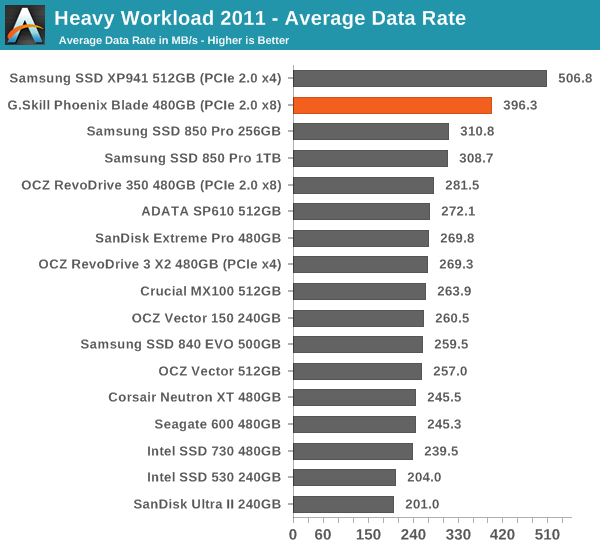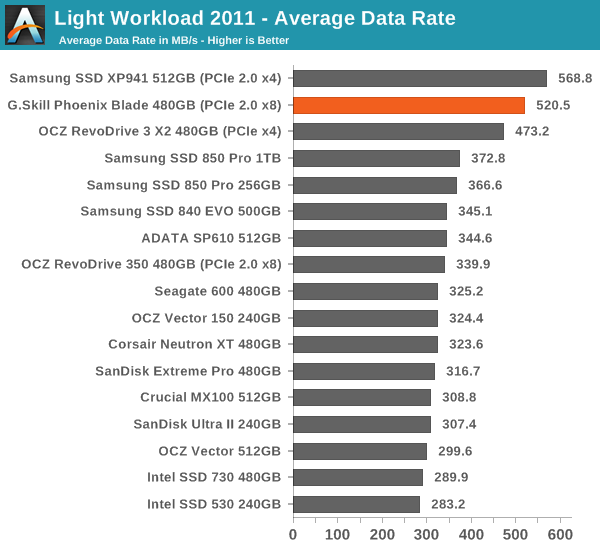G.Skill Phoenix Blade (480GB) PCIe SSD Review
by Kristian Vättö on December 12, 2014 9:02 AM ESTAnandTech Storage Bench 2011
Back in 2011 (which seems like so long ago now!), we introduced our AnandTech Storage Bench, a suite of benchmarks that took traces of real OS/application usage and played them back in a repeatable manner. The MOASB, officially called AnandTech Storage Bench 2011 – Heavy Workload, mainly focuses on peak IO performance and basic garbage collection routines. There is a lot of downloading and application installing that happens during the course of this test. Our thinking was that it's during application installs, file copies, downloading and multitasking with all of this that you can really notice performance differences between drives. The full description of the Heavy test can be found here, while the Light workload details are here.

The Phoenix Blade continues to be strong in our 2011 Storage Benches, although the XP941 retrieves its crown as the fastest client drive. I'm guessing the XP941 is more optimized for typical client workloads, which the 2011 suites present, whereas the 2013 workload is much, much heavier and only applies to users with very heavy IO workload.











62 Comments
View All Comments
otherwise - Monday, December 15, 2014 - link
For those interested, here is the P3xxx series page at intel, which used to contain all three models, but now just the P3600 and P3700: http://www.intel.com/content/www/us/en/solid-state...otherwise - Monday, December 15, 2014 - link
Fixed link: http://www.intel.com/content/www/us/en/solid-state...r3loaded - Friday, December 12, 2014 - link
Is anyone ever going to get around to producing a native PCIe drive that's actually available at retail for enthusiasts to buy for their systems? Bonus points if it supports NVMe. The SSD in my MacBook Pro is faster than the one in my desktop PC and that just doesn't sit right with me.biostud - Friday, December 12, 2014 - link
Can't it boot from a X99 setup?FunBunny2 - Friday, December 12, 2014 - link
The text says 2281, but the table 2282?? Typo? Matter much?Antronman - Friday, December 12, 2014 - link
For just $300 more, I'll take an iO-FX any day over this PCIe SSD.Poik - Friday, December 12, 2014 - link
Only price I see for an iO-FX is $1380 from Amazon. That's pretty much $700 more or double the price. Even so for an extra $300 I'd rather have 2 XP941's.Antronman - Friday, December 12, 2014 - link
I was comparing Amazon costs, as I found the Phoenix Blade 480GB for $1000 on Amazon. But after checking Newegg, it is only $680 on Newegg. Oh well. The iO-FX is still worth it. The speed and reliability is simply second to none. While it might be a little bit overkill for the average consumer, I don't believe PCIe SSDs (especially ones this expensive) are for the average consumer. If you're buying a single storage drive that costs $680, you can buy a storage drive that costs $1400.bill.rookard - Friday, December 12, 2014 - link
Interesting piece of hardware, but I'm interested in it more for my used servers. I have several running and something with that kind of durability rating and the all important backwards compatibility and form factor would allow me to have all kinds of fun with that on my Xeon box.Of course, two of them would set me back $1500.00 - details, details.
Supercell99 - Saturday, December 13, 2014 - link
My guess is for a server environment, something that has to be 24/7, a product this new should be tested for a while before I would put it into a production machine, just to see what happens :)